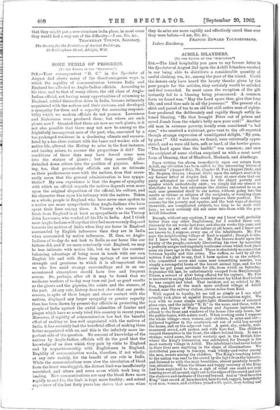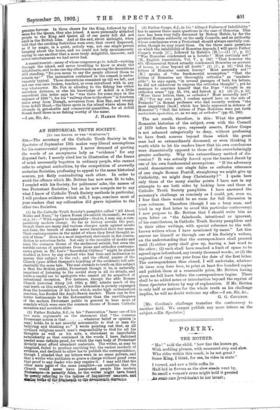ACHILL ISLANDERS.
[TO THE EDITOR OF TUE "SPECTATOR."]
SIR,—The kind hospitality you gave to my former letter in the Spectator of August 2nd upon the Achill Islanders resulted in our being able to distribute a considerable quantity of useful clothing, tea, &c., among the poor of the island. Could the donors only have heard the hearty thanks given by the poor people for the articles, they certainly would be satisfied and feel rewarded. In most cases the reception of the gift instantly led to a blessing being pronounced. A common form we found was, "May the Lord spare thee, give thee long life, and send thee safe in all thy journeys!" The present of a shirt and parcel of tea to an old but still active man of eighty- four produced the deliberately and rapidly though softly in- toned blessing, "He that brought Peter out of prison and saved Jonah from the whale's belly save your soul!" Another old man in extreme poverty, locally even considered "a bad case," who received a waistcoat, gave vent to the oft-repeated though strange expression of unmitigated delight, " By gum, by gum !" Old waistcoats, we found, were universally appre- ciated, and so were old hats, soft or hard, of the bowler genus. " The Lord spare thee the health!" was common; and once the recipient of some clothes surprised us with a most novel form of blessing, that of Shadrach, Meshach, and Abednego.
Since writing the above, immediately upon our return from Achill, my attention has been called to the interesting letters of " Narrator " (August 9th), Mr. Charles H. Fox (August 23rd), and Mr. Stephen Gwynn (August 30th) upon the subject started by my former letter of August 2nd. I may at once state that our party attempted no radical cure for the abject poverty and squalor which undoubtedly exist ; we simply did our utmost to distribute to the best advantage the clothes entrusted to us, as each case presented itself to our notice, without going into the merits or virtues or religion of the recipients, or worrying them with our views of how they could improve their position. The reasons for the poverty and squalor, and the best ways of dealing therewith, are complicated subjects, too long to be dealt with here ; we most certainly did not enter into them with the poor Achill Islanders.
Dooagh, without any egotism, I may say I know well, probably better than any other Englishman, for I resided there con- tinuously for six weeks last year, and also six weeks this year, and have been in avd out of the cabins at all hours, and I know and am known to, I suppose, every one of the inhabitants. Mr. Fox says the neighbouring village of Keel is squalid ; Dooagh is also, for I know both, but more so. Mr. Fox throws doubt upon the loyalty of the people, curiously illustrating his view by narrating a perfectlyunique and singularly loathsome crime which took place some six years ago in the island. There is absolutely no connection between loyalty and this crime. The ruffian, so held by all the natives, I am glad to say, that I have spoken to on the subject, who committed arson and came near committing murder, was simply a revengeful brute of the lowest animal type, and for his crime he got penal servitude for life, from which on Saturday, September 6th last, he unfortunately escaped from Maryborough Prison, a reward of £100 being offered for his capture. Mr. Fox is incorrect in saying that this scoundrel once lay hid at Keel before he was caught and tried. That incident, not as related by Mr. Fox, happened at the much more civilised village of Achill Sound, near the railway station, eleven miles from Keel.
With regard to loyalty, let me tell as simply as I can what actually took place at squalid Dooagh on Coronation night. We took with us some simple night-light illuminations of coloured glass cups, and the initials "E. B." in the same, and these, with a crown and Prince of Wales feather and Japanese lanterns, we affixed to the front and windows of the house (the only house, bar the public-house, with a slate roof). When evening came I suppose the whole village—men, women, and children, in arms and out— gathered together in the courtyard, cut out of solid bog around
the house, and on the adjacent road. A quiet, shy, orderly, well- mannered crowd, soft spoken and with bare feet. The children ranged themselves in the front, the elders behind them. It was a strange, weird scene, the most westerly spot in the British Isles where the King's Coronation was celebrated, for Dooagh is the most westerly village in Achill. The inhabitants had never before in their lives seen anything in the shape of illuminations. We distributed pea-soup in teacups, weak whisky-and-water among the men, sweets among the children. The King's touching letter to the nation was read to the crowd by the light from the lanterns, and listened to with the most breathless, almost painfully breath- less, attention. When the illness and happy recovery of the King
had been explained to them, a sigh of relief one could not help hearingarose all around, right out to the edges of the crowd and into the shadows and darkness of the road beyond. And in " God Save the King" that crowd of .bare-headed,bare-footed, ragged, beautifully eyed men, women, and children joined with quiet, deep feeling ant: genuine fervour. In three cheers for the King, followed by the same for the Queen, they also joined. I more personally attached people to the King and Queen all of our party felt • did not exist in the British Isles. And at the end, about midnight, when told that the exciting festivities were over, that crowd dispersed, as if by magic, in a quiet, orderly way, not one single person hanging about the house, and we could not help spontaneously saying to one another that a more truly delightful, innocent, and novel entertainment we had never had.
A casual tourist—many of whose congeners go to Achill—rushing through the island, and never troubling to know or study the inhabitants, said to me one day afterwards on seeing the decorations still standing, "Do you mean to say the people allowed those to remain up !" The insinuation contained in the remark is unfor- tunately typical. Those decorations remained up till we left, and not one was once broken, touched, or even interfered with in any way whatsoever. Mr. Fox in alluding to the fishing has either mistaken distance, or else his knowledge of Achill is a little superficial (his letter says he "was there for some days in the summer of 1899 "), for his " railway close to the shore " is fourteen miles away from Dooagh, seventeen from Kim Bay, and twenty from Achill Head,—the three spots in the island where alone fish abounds in get-at-able and commercial quantities, for at Achill Sound itself there is no fishing worthy of the name.







































 Previous page
Previous page